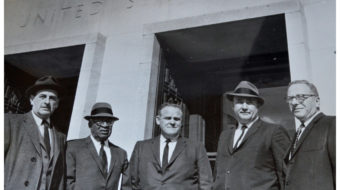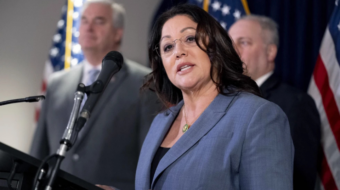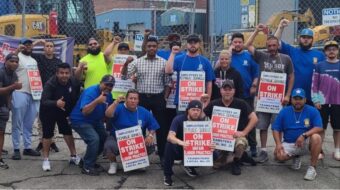An article in the Peoples Weekly World earlier this year explained that the National Labor Relations Board had put a freeze on consideration of all contested cases because of a ruling by a right-wing federal judge. (.)
Judge David Sentelle of the D.C. Circuit Court of Appeals used round about reasoning to rule May 1 in favor of a company that had challenged a board ruling that it had violated numerous labor laws. The decision threw a wrench into the entire NLRB operation and has endangered numerous efforts by workers fighting for their rights on the job.
Here’s why: The five-member NLRB has, since Dec. 31, 2007, had only two sitting members, Democrat Wilma Liebman and Republican Peter Schaumber, and three vacancies. Before the last two left the board at the end of 2007, the then group of four decided to delegate NLRB’s authority to a panel of three. Even if the third member was a phantom, in cases where Liebman and Schaumber agreed on a solution there would be a quorum of two. After that, the two remaining members agreed upon and therefore decided 300 cases, all 2-0.
Under the law, the NLRB is normally supposed to have five members, all appointed by the president and confirmed by the Senate. It is required that three are members of the political party holding the White House and two are members of the opposition party.
Judge Sentelle said that because of the law all the 2-0 rulings are illegal and that all 300 cases should be put on hold and decided all over again, once the NLRB has a quorum.
The NLRB petitioned the Supreme Court May 27 in order to break the logjam, but no decision has been made.
During the interim the potential for danger to workers’ rights has been clear. The NLRB oversees labor-management relations, determines whether unions can seek recognition elections at worksites, decides which jobs are covered in potential bargaining units, and whether unions can be ousted as the result of particular decertification efforts. The board also rules on whether a particular class of workers may or may not be covered by labor law, therefore having the right to organize.
Now President Obama has nominated people for each of the three vacancies and, assuming quick confirmation by the Senate, the NLRB, for the first time in more than eight years, will have a pro-labor majority.
For the one Republican vacancy the president has nominated GOP senate staffer Brian Hayes. Hayes is now GOP labor policy director for the Senate Committee on Health, Education, Labor and Pensions. As a private practice lawyer he represented management clients in labor and employment law.
For the remaining two Democratic vacancies the president has made selections that should guarantee a 3-2 pro-labor majority on the NLRB for the first time since the Bush administration took over in Washington.
Democrat Craig Becker, one of those nominees, is associate general counsel to both the Service Employees International Union and the AFL-CIO.
Democrat Mark Pierce, the other nominee for that party’s vacancy, practices union-side labor law before state and federal courts. In the 1980’s he was an attorney and district trial specialist for the NLRB itself.









